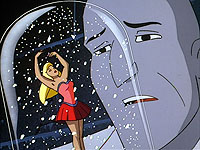 |
Victor Fries: Cold and Alone
by Scott Summers
 Among the worldly difficulties suffered by the not-very-good Dr. Victor Fries we find, in reverse order of severity: Batman, who ruins a good grudge every time; the whole cold thing, which makes surviving in temperatures higher than zero (or anywhere near a popcorn maker) infeasible; freezer burn on the earlobes and pinky toes; and, most significantly, the suit. As a remedy for Victor’s unique thermostat-control problem, the cure is many times worse than the condition. Because of the suit, Fries is cut off from his dear wife, from any former friends who might still tolerate his chilly eccentricities, and from the rest of humankind besides. And there’s no end in sight: “I would trade a thousand of my frozen years for your worst day,” he sonorously informs the once-envious Grant Walker.
Among the worldly difficulties suffered by the not-very-good Dr. Victor Fries we find, in reverse order of severity: Batman, who ruins a good grudge every time; the whole cold thing, which makes surviving in temperatures higher than zero (or anywhere near a popcorn maker) infeasible; freezer burn on the earlobes and pinky toes; and, most significantly, the suit. As a remedy for Victor’s unique thermostat-control problem, the cure is many times worse than the condition. Because of the suit, Fries is cut off from his dear wife, from any former friends who might still tolerate his chilly eccentricities, and from the rest of humankind besides. And there’s no end in sight: “I would trade a thousand of my frozen years for your worst day,” he sonorously informs the once-envious Grant Walker.
Most of us would feel the same way about living for eternity sealed into a form-fitting fish tank. But Victor also likes to insist that he’s dead to emotions, that his heart is a solid block of ice. So why, then, does it bother him? If he’s beyond anger, sadness, and self-pity, what’s up with the lonely angst, the soliloquies of solitude? Oh, and one more thing—how is it that he still loves Nora?
Let’s say, just for the sake of argument, that Victor Fries put on the suit entirely by choice. What, then, would it mean for a man to insulate himself from others to the point that he couldn’t shake hands, peck a girl on the cheek, or hop in the sack? Put the industrial accident aside and you see a man hiding from the world, isolated from the painful, chaotic stew of emotions other people bring forth. You see a pervasive discomfort with all social contact—in other words, you see a schizoid personality. The suit, as a metaphor for this disorder, fits like a hermetically-sealed glove. Clinical descriptions of schizoid personalities come off like a straight character analysis of Mr. Freeze: lacks close relationships, prefers solitude, takes pleasure in very few activities, appears indifferent to others’ opinions, and—bingo!—shows emotional coldness, detachment, or flattened affect.
Looking beneath that icy surface, however, we see that Fries is forever carrying the torch, so to speak, for his wife, and threatening to visit his boundless, glacial rage on Gotham. “He lives for revenge,” is Bruce Wayne’s pithy diagnosis. So why is all this anger frothing about in a guy whose heart is supposedly no warmer than a Klondike bar? By striking out he attracts Batman and Robin’s notice, risking defeat and capture. He also gains wholesale Gotham notoriety and draws out antagonistic tycoons Grant Walker and Derek Powers. In fact, Fries’s public vengefulness actually serves as a perverse mechanism for relating to people, for bringing in the other human beings he both fears and longs to know. They don’t get close to him, but, paradoxically, they do come to understand him quite well. Psychologists might call this a schizoid compromise, in that it serves Fries’s needs for connection as much as it does his fear of closeness. It keeps him suspended between the two.
During Victor’s brief stay in Arkham, the main challenge for a shrink would have been breaking through his thick igloo of arrogance and isolation. Arguably, Victor is too invested in his Mr. Freeze personality to let a therapist get to know him—his twin defenses, anger and withdrawal, would wall most people out—but his continuing love for Nora is quite a good sign. In time, and barring the intervention of another megalomaniacal billionaire, Victor might come to know some of his former human warmth once again.
DSM-IV-TR Diagnosis: 301.20 Schizoid Personality Disorder
Back to Harvey Dent |
Forward to Temple Fugate |